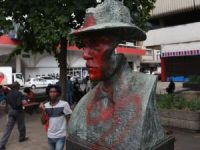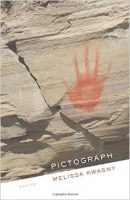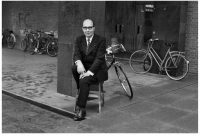April 29, 2015
Edited by David Sanders
Specimen Days
534 – Taliesin, Welsh poet, according to legend in Mabinogion, is born.
1630 – Agrippa d'Aubigné, French poet (b. 1552), dies.
1658 – John Cleveland, English poet (b. 1613), dies.
1863 – Constantine P. Cavafy, Greek poet (d. 1933), is born.
1893 – Elisaveta Bagrjana, [Beltsheva], Bulgaria, poet, is born.
1933 – Constantine P. Cavafy, Greek poet (b. 1863), dies.
1943 – Sidney A K Keyes, English poet (Foreign Gate), dies at 20.
1996 – Jaime Garcia Terre, poet/essayist, dies at 71.

Long Ago
I'd like to speak of this memory,
but it's so faded now -as though nothing's left-
because it was so long ago, in my adolescent years.
A skin as though of jasmine…
that August evening -was it August?-
I can still just recall the eyes: blue, I think they were…
Ah yes, blue: a sapphire blue.
—Constantine P. Cavafy (1863–1933)
“I’d like to speak of this memory, / but it’s so faded now -as though nothing’s left-“—Constantine P. Cavafy
World Poetry
Egyptian Poet Abnudi Dies at 76

Egyptian poet Abdel Rahman al-Abnudi, widely known for his revolutionary verse and criticism of two toppled presidents, died Tuesday at the age of 76, his wife said. Abnudi, who underwent brain surgery at a Cairo hospital just days ago, rose to prominence in the 1960s for his poems, some performed by legendary Arab singer Abdel Halim Hafez.
Poet’s Statue Covered in Paint

Another statue in Durban has been defaced as the colonial statue debate in South Africa rages on. The bust of famed Portuguese poet Fernando Pessoa who lived in South Africa from 1895 to 1905, situated on an island between Dr AB Xuma (Commercial) Road and Monty Naicker (Pine) Street was covered in red paint this week. Written in red alongside the bust were the words “EFF response”.
Federico García Lorca was Killed on Official Orders, Say 1960s Police Files
Playwright and poet Federico García Lorca was arrested and killed on the orders of rightwing military authorities in Granada, according to newly released documents that shed light on the death of one of the highest-profile victims of the Spanish civil war. The documents, written in 1965 at the Granada police headquarters and obtained by the Guardian, are the first ever admission by Franco-era officials of their involvement in the death in 1936 of the author of Blood Wedding and the House of Bernarda Alba.
Egyptian poet Abdel Rahman al-Abnudi, widely known for his revolutionary verse and criticism of two toppled presidents, died recently at the age of 76.
Recent Reviews
Colm Toibin on Elizabeth Bishop: A Different Kind of Literary Tango
by Jeff Gordinier
Captivating books are often born when one writer is obsessed with another. Nicholson Baker’s “U and I” (about John Updike) and Geoff Dyer’s “Out of Sheer Rage” (about D. H. Lawrence, sort of) spring to mind, but those are wild, hilarious books, almost like antic pranks. “On Elizabeth Bishop,” the novelist and critic Colm Toibin’s compact new study of the poet’s work, has little in common with them, but it succeeds as a different kind of literary tango. It hums instead of crows. Its pull on the reader is almost tidal.
‘The Do-Over,’ by Kathleen Ossip
by Stephen Burt
“Oh, wow, mausoleums”: That’s the title Kathleen Ossip gives to the final poem in “The Do-Over,” her third book, and that disarming phrase sums up her goals. Ossip writes to remember the dead, especially Andrea Ossip (1944-2008), her husband’s stepmother; to face her own death without panic, if she can; to help us face ours; and to show how an aggressively up-to-date vocabulary — one that would make a lesser writer sound jaded, or bored, or distracted by pings from her iPhone — can fit the most serious of poetic concerns.
Wislawa Szymborska’s ‘Map: Collected and Last Poems’
by Richard Lourie
The mass of men may “lead lives of quiet desperation,” as Thoreau wrote, but the Polish poet Wislawa Szymborska (1923-2012) did just the opposite: She lived a life of quiet amazement, reflected in poems that are both plain-spoken and luminous. Many of them are gathered now in “Map: Collected and Last Poems.”
The Exoskeleton and the Blues
by Jonathan Farmer
The book the book the book the book the book. The moment talk of poetry turns institutional, it’s all about the book. The reviews of poetry in the places that still cover it—the New York Times, say, or Slate—deal exclusively with books. Almost all the major poetry prizes honor books. (Even the most prominent exception—Best American Poetry—is only available as a book.) Poets hoping to go pro—landing tenure-track jobs at universities—first have to publish a minimum number of books. In some cases (Louise Glück and Claudia Rankine come immediately to mind) this works out just fine.
Road Warrior
Karen Solie makes inroads and dazzles with her American debut
by Ange Mlinko
I’m thinking of a non-heroic poetry. Non-heroic, that is, in the sense that the self-spinning, self-staging protagonist-diva—the lyric “I”—cedes to a role drab, almost anonymous, from the corps. A non-heroic poetry that deflects the reader toward consideration of situations, contexts, and all that is given, inherited, received from a hostile or indifferent world—particularly its language.
Captivating books are often born when one writer is obsessed with another.
Broadsides
Gift and Gear: The Work of Thomas McGrath
by Joshua Weiner

I met Thomas McGrath in the summer of 1987. I was writing a master’s thesis on him, and had travelled by train to Minneapolis with a six-pack of Buckhorn beer, which was godawful beer favored by McGrath, to meet him for an interview. McGrath was living alone in a modest apartment complex across the street from The Loft Literary Center; folks there were helping him out from time to time to get along physically. At age 71, he suffered from terrible arthritis in his hands; sometimes, he told me, it was so bad he couldn’t bear to hold a piece of paper.
Dear Ms Morgan: Your guidance is a mini-syllabus on how to wreck poetry
by Michael Rosen
Along with many other poets, I receive many invites to go into schools to share my poetry with pupils, to talk about how and why we write and read poems. I’ve been doing this since 1974. We think it’s a good idea because teachers, children and poets value poetry. If you put a group of poets, teachers, pupils and parents in a room to talk about why we do this, we come up with a wide range of answers.
Working through Ted Hughes’ “February 17th”
by Joseph Spece
I’ve cared for this poem since I first read it in 2009. In terms of European nature poetries, Hughes’ most probing moments strike me as having an aggressive, preemptory, bold linguistic content—as, in this poem, ‘downpour dishclout sunrise,’ ‘mudded,’ ‘to hook a knee,’ ‘flapping of the backward / Lump head of the lamb looking out’—that easily bests Heaney, if they fall short of Thomas and Hopkins. Yet my affection for “February 17th” is recently qualified by how I understand the speaker’s treatment of the simultaneously animal/female ‘antagonist’—is she not antagonist to the speaker’s role as a kind of shepherd-narrator?—specifically, her situation as ultimately culpable in the death of her own lamb. Sidereal to these qualifications are fears that gender politicking or matters of animal rights might, in my own understanding, be usurping the primacy of “February 17th” as art-object.
Poet Thomas McGrath by the end of his life had difficulty holding a piece of paper due to terrible arthritis in his hands.
Drafts & Fragments
31 Contemporary Poets You Need To Read

The 50 Best American Poetry Books of the Decade so Far
By Jonathon Sturgeon
No poem in the preceding decade captured the spirit of the times more than Frederick Seidel’s “December.” The product of a Faustian pact, it fixed itself in a fiendish dialectic, a self-canceling logic that likewise trapped the reader like a dying fly — in the politics of the War on Terror, in the axiomatic hell of the Bush presidency.
Thirty-one contemporary poets you need to read.
Poetry In the News
Pulitzer-Prize Winning Poet Is a Columbia Teacher and Student

Gregory Pardlo, a poet and writer, was picking his daughters up from school on Monday afternoon, April 20, when his phone began pinging and vibrating with dozens of text messages, all saying "congratulations." He had recently been nominated for the Hurston/Wright Legacy Award, so he assumed that's what the kudos were for. Then he saw that one of the messages had the word "Pulitzer" in it. "I didn't faint, but I did make a really embarrassing mewling sound, like "wwwhhhaaaaattt?'"
Poetry Is Going Extinct, Government Data Show
Is verse a dying technique? How dead is poetry? Who killed poetry? Does anybody care? Is poetry dead? Is poetry dead? Is poetry dead? Inquiries into the death of poetry comprise a tradition almost as rich and varied as American poetry itself. Earlier this month, a college literary magazine proposed a tidy solution to the evergreen problem: "if you have to keep declaring, over and over, that poetry is dead, it can’t actually be dead."
Baryshnikov to Perform in a Show Based on Brodsky’s Poetry
Mikhail Baryshnikov will perform in a new solo work based on the poems of Joseph Brodsky, created for him by Alvis Hermanis, the director of the New Riga Theater in Riga, Latvia, where Mr. Baryshnikov was born. Called “Brodsky/Baryshnikov,” the piece will have its premiere in Riga on Oct. 15. A tour to the United States, as part of an international tour, is planned for 2016.
Poetry at Tech Helps Expand Students’ Outlooks
Although ensconced in a corner of the Skiles courtyard and tucked into a brick wall, the small glass foyer on which bold yellow letters that read “Poetry at Tech” are painted is clearly visible from the walkway. Despite its distinct and rather peculiar physical presence on Tech’s campus, many students are unaware of what Poetry at Tech truly has to offer. “[The mission] of Poetry at Tech is to bring poetry to as wide an audience as possible, to recognize poetry for its possibilities in all our lives and to recognize those involved in the craft of writing poetry — poets as well as spoken word performers, whether accomplished, rising or beginning — for the artists they are,” Thomas Lux, a Tech professor and the Director of Poetry at Tech, said.
Gregory Pardlo, a poet and writer, was picking his daughters up from school on Monday afternoon, April 20, when he was notified he won the Pulitzer Prize.
New Books
Pictograph: Poems by Melissa Kwasny
[Paperback] Milkweed Editions, 80 pp., $16.00

“If you would learn the earth as it really is,” N. Scott Momaday writes, “learn it through its sacred places.” With this quote as her guiding light, Melissa Kwasny traveled to the ancient pictograph and petroglyph sites around her rural Montana home. The poems in this collection emerge from these visits and capture the natural world she encounters around the sacred art, filling it with new, personal meaning: brief glimpses of starlight through the trees become a reminder of the impermanence of life, the controlled burn of a forest a sign of the changes associated with aging. Unlike traditional nature poets, however, Kwasny acknowledges the active spirit of each place, agreeing that, “we make a sign and we receive.” Not only do we give meaning to nature, Kwasny suggests, but nature gives meaning to us. As the collection closes, the poems begin to coalesce into a singular pictograph, creating “a fading language that might be a bridge to our existence here.”
Deep Lane: Poems by Mark Doty
[Hardcover] W. W. Norton & Company, 96 pp., $25.95
Deep Lane is a book of descents: into the earth beneath the garden, into the dark substrata of a life. But these poems seek repair, finally, through the possibilities that sustain the speaker aboveground: gardens and animals, the pleasure of seeing, the world tuned by the word. Time and again, an image of immolation and sacrifice is undercut by the fierce fortitude of nature: nature that is not just a solace but a potent antidote and cure. Ranging from agony to rapture, from great depths to hard-won heights, these are poems of grace and nobility.
The Rival by Sara Wallace
[Paperback] University of Utah Press, 90 pp., $14.95

In The Rival, Sara Wallace takes her readers on an intimate journey through a woman’s solitary, surreal rural childhood and her brutal, sexually fraught first marriage to the conflicted redemption she finds in motherhood and a second chance at love. In this debut poetry collection, Wallace reveals how closely emotional devastation and transcendence can coexist. The Rival is sensuous, darkly humorous, and frequently luminous in its unflinching exploration of the inner life.
Dirty Bomb by Mark Neely
[Paperback] Oberlin, 80 pp., $15.95
Robin Behn called Mark Neely’s first collection “nothing less than a mandala of the human spirit.” Now, in Dirty Bomb, his formidable talents take on a wider and more public dimension. This book of poems explores life in 21st-century America, particularly the juxtaposition of intimate human relationships with the politics and violence of U.S. militarism, terrorism, and the threat of environmental apocalypse. Oil tankers leak, atrocities play out across the internet, “the present / always drags the past into the future.” Yet Neely’s piercing intelligence and dry wit keep the poems light on their feet and unexpected in their perceptions. Angry, baffled, moon-drunk, and visionary, these poems chart the promise and the danger of America in fresh and memorable ways.
Study for Necessity by JoEllen Kwiatek
[Paperback] University Of Iowa Press, 72 pp., $19.95

“Kwiatek’s poems emit the uncanny luminosities of the artists’ worlds they refer to: those of Caspar David Friedrich, Albert Pinkham Ryder, Odilon Redon. Each is a ‘token of strangeness’ built with delicacy and restraint, embodying, vivifying what the poet calls the mind’s ‘lonesome flourish.’ Like entries in a recondite log, or the etchings, or tracks, of a complex consciousness, this work cannot help but identify its own material and spiritual corollaries: a bridle worn to threadbare, a voyage that ‘grows more & more captivating. More terse.’ It is, as one poem puts it, as if seeing / were a form of radiant / isolation. And yet the presence established over the course of the book is profoundly connective, rich with acute physical apprehension and charge. It moves under pressure toward its singular end, its very ‘necessity.’”—Emily Wilson
Each of JoEllen Kwiatek’s poems are a ‘token of strangeness’ built with delicacy and restraint, embodying what the poet calls the mind’s ‘lonesome flourish.’
Correspondences
Gregory Pardlo, Pulitzer Winner for Poetry, on His Sudden Fame
by Alexander Alter
An an unabashedly glorious afternoon this week, the poet and essayist Phillip Lopate stood in front of a small group of graduate students in Columbia University’s creative writing program. He took attendance, noting a few absences, before turning to a discussion about the German filmmaker Harun Farocki. But first he singled out a student sitting at the lecture table, who was fiddling with his pen and notebook, with a backpack stuffed full of library books at his feet. “I just want to embarrass Greg and make an announcement,” Mr. Lopate said. “He just won the Pulitzer Prize for poetry.”
Oakland's Matthew Zapruder, a late-blooming poet, says it's the language that fires his imagination
by Georgia Rowe

When Matthew Zapruder was growing up, he never imagined he'd become a poet. In fact, he says, poetry wasn't on his radar at all. "I did not think of myself as an artistic person growing up," says Zapruder. "I don't think I knew any poets. I just didn't have a context for it.” Flash forward to today. Zapruder is the author of four volumes of poetry — his latest, "Sun Bear," was released last year — and he talks about poems with a singular passion.
At 84, Poet Gary Snyder Lives In 'This Present Moment'
Poet Gary Snyder has hung with the Beats, studied Buddhism, worked as a logger and he's still going strong. He talks with NPR's Linda Wertheimer about his new collection, This Present Moment.
In What World Is Pleasure Itself Not Political: An Interview with Jericho Brown
by Weston Cutter

Jericho Brown’s poetry’s the powerfully gentle sort that welcomes you incredibly into itself and then after awhile you notice how intently it’s directing your attention, like a warm hand on your jaw pointing your face at something and not shouting or whispering but just saying—I imagine it always a little hummed—Look.
When Matthew Zapruder was growing up, he never imagined he’d become a poet.
Envoi: Editor’s Notes
Lessons from the Past: Philip Larkin

Philip Larkin on the Voices of Poets
All my antiquarian rage boils at the thought that nobody thought to record Hardy.
Had the history of technology meshed a little differently with the history of literature I might now be able to lay reverently on my turntable a thick black 78 rpm with a Globe label reading Will Shaxsper: Sundrie Sonnets (recording supervif’d by my Lord Veralum), and, after a vertiginous crackling pause, hear in almost incomprehensible Elizabethan “From fairest creatures we desire increase,/That thereby beauty’s rose might never die . . .” What should I gain if I could? Concede at once the souvenir value: it would be fascinating as a photograph, or J P Morgan’s lock of Keats’s hair. But would Will’s Warwickshire, or for that matter Wordsworth’s Westmoreland, have any more relevance to my reading of their poems (once my excitement had died down) than Tennyson’s Lincolnshire (which in fact we have) to The Northern Farmer? Read more here.
Philip Larkin on the voices of poets.